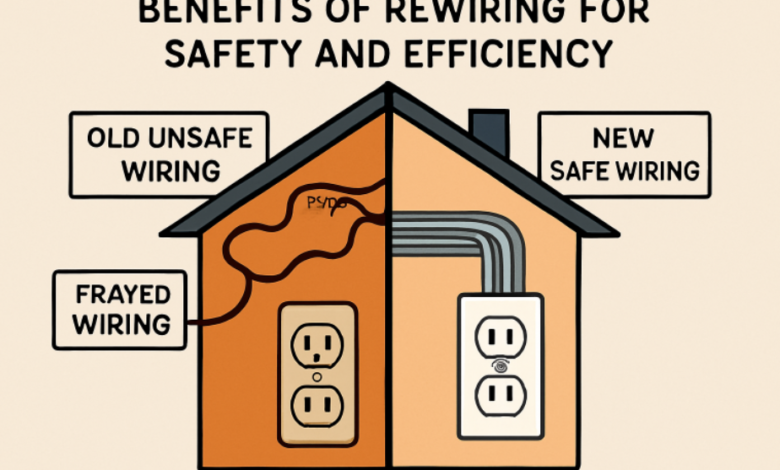How Rewiring Improves Home Safety and Efficiency

What Makes Safe Wiring So Important?
Electrical safety remains one of the most important responsibilities for any homeowner. Modern appliances, high-powered devices, and increased energy demands all depend on reliable wiring. Faulty wiring can create hidden hazards that may lead to property damage and personal injury. Studies, such as those published by the National Fire Protection Association, show that electrical failures and malfunctions account for thousands of house fires each year. Taking prompt action, like scheduling inspections and investing in professional house rewiring services in Matthews NC, is fundamental to supporting both safety and overall home functionality.
Outdated electrical systems are particularly concerning in older homes, where the original wiring often doesn’t support modern electrical loads. Over time, insulation on wiring can degrade, connections may loosen, and the risk of shorts or sparks rises considerably. By upgrading your wiring with the help of qualified professionals, you not only reduce fire and shock risks but also ensure every room in your house is ready to handle everyday electricity needs. This is essential for running energy-hungry appliances safely and reliably.
How Outdated Wiring Puts Homes at Risk
Many homeowners don’t realize just how much outdated wiring endangers daily living. Traditional knob-and-tube systems or cloth-insulated cabling, common in homes built before the 1970s, were never designed with today’s electrical demands in mind. These systems often lack grounding and can’t safely support the large number of electronics, chargers, and high-wattage appliances found in a modern household. Warning signs like flickering lights, burning smells, buzzing outlets, or breakers tripping repeatedly are urgent indicators that your wiring needs professional evaluation. Proactively addressing these red flags with expert help can prevent emergency situations and costly repairs down the line.
Modernizing for Greater Efficiency
Upgrading your home’s wiring isn’t just about safety—it’s also a direct path to greater efficiency and comfort. New wiring materials and methods help minimize energy loss, keep circuits balanced, and make integrating energy-efficient appliances effortless. When electricians update your circuitry, they usually add grounded outlets, increase the number of circuits, and introduce safer breaker panels. These improvements mean your HVAC, kitchen gadgets, and high-speed internet networks can all operate optimally without straining the system.
Rewiring can also lead to savings on your monthly bills. Old, degraded wiring causes subtle energy waste, which adds up over time. Upgrades often support new technologies, such as LED-compatible lighting and smart thermostats, both of which further drive down household energy usage. Beyond everyday savings, these enhancements make your home more appealing if you decide to sell, since buyers increasingly value energy efficiency and smart technology readiness.
Recognizing When Rewiring Is Needed
Knowing when to consider rewiring can protect your home and your investment. Persistent breaker issues, visible scorch marks on outlets, and appliances that frequently lose power are more than just inconveniences; they may indicate dangerous wiring problems under the surface. Houses over 40 years old, or those with recent major renovations or additions, are prime candidates for a professional wiring assessment. Additionally, updated codes and insurance requirements make electrical inspections critical, as undetected electrical issues can impact your ability to secure or renew home insurance.
See also: Ways SINTRONES’ NVIDIA Jetson AGX Orin Revolutionizes Smart Traffic Technology
Benefits of Rewiring Beyond Safety
While safety concerns are the primary reason for rewiring, there are valuable additional advantages. Updated systems ensure your home can accommodate today’s technology, such as electric vehicle charging stations, home theaters, security cameras, and dedicated circuits for offices or workshops. Rewiring also lays the groundwork for smart home upgrades, supporting automated lighting controls and integrated security systems. If you’re planning to sell, modernized electrical infrastructure gives your home a distinct edge in the market, improving both value and buyer confidence. The U.S. Department of Energy’s Energy Saver website offers a wealth of guidance on the basics of electricity, wiring, and best practices for efficiency and homeowner safety, making it a valuable resource for anyone considering electrical upgrades or rewiring.
Common Myths About Home Rewiring
- Myth: Only very old homes need rewiring.
- Reality: Even newer or recently renovated homes can have overloaded or mismatched circuits that need to be addressed.
- Myth: Rewiring means tearing down every wall.
- Reality: Many electricians are skilled in using minimal-impact techniques, often accessing wiring through attics, crawlspaces, or existing outlets with limited disruption.
- Myth: DIY fixes are cheaper and just as safe.
- Reality: Without proper training, DIY electrical work can result in serious safety hazards and code violations. Always trust licensed professionals for critical upgrades.
What to Expect During a Rewiring Project
- Assessment: A licensed electrician conducts a detailed evaluation of your current system, identifying areas that require updates and planning the scope of work.
- Preparation: Circuits and relevant areas are safely disconnected, and access points like outlets, switches, and junction boxes are opened for easier wiring installation.
- Installation: Old wiring is replaced with new, code-compliant materials. Electricians might add GFCI outlets in kitchens and bathrooms for additional safety, and ensure all upgrades match local code requirements.
- Inspection: The entire system is tested for correct operation, proper grounding, and compliance with the National Electrical Code. Local inspectors may also perform a final review before sign-off.
- Cleanup: Professionals restore access points and workspaces, leaving your home ready for normal activities with greatly improved safety and performance.
Staying Informed on Electrical Safety
Addressing electrical repairs and rewiring proactively is essential to protecting your family’s safety and your home’s comfort. Routine maintenance, paired with professional upgrades, helps keep your electrical system reliable, efficient, and compliant with current codes. Trusted resources like Consumer Reports offer valuable guidance on recognizing potential issues and making smart upgrade decisions, empowering homeowners to stay ahead of hidden risks. By committing to ongoing learning and investing in proper electrical infrastructure, you reduce hazards and prepare your home for today’s and tomorrow’s energy demands.
Ultimately, rewiring is more than a technical upgrade—it’s an investment in peace of mind, energy efficiency, and long-term property value. Taking action today ensures your home remains safe, resilient, and future-ready for years to come.



